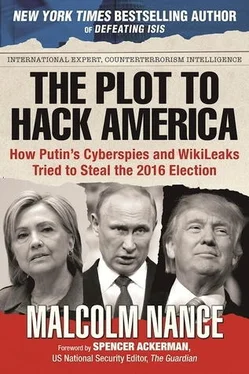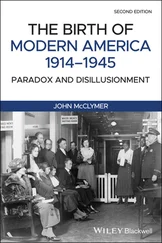Malcolm Nance - The Plot to Hack America
Здесь есть возможность читать онлайн «Malcolm Nance - The Plot to Hack America» весь текст электронной книги совершенно бесплатно (целиком полную версию без сокращений). В некоторых случаях можно слушать аудио, скачать через торрент в формате fb2 и присутствует краткое содержание. Город: New York, Год выпуска: 2016, ISBN: 2016, Издательство: Skyhorse Publishing, Жанр: Политика, Публицистика, на английском языке. Описание произведения, (предисловие) а так же отзывы посетителей доступны на портале библиотеки ЛибКат.
- Название:The Plot to Hack America
- Автор:
- Издательство:Skyhorse Publishing
- Жанр:
- Год:2016
- Город:New York
- ISBN:978-1-510-72332-0
- Рейтинг книги:4 / 5. Голосов: 1
-
Избранное:Добавить в избранное
- Отзывы:
-
Ваша оценка:
The Plot to Hack America: краткое содержание, описание и аннотация
Предлагаем к чтению аннотацию, описание, краткое содержание или предисловие (зависит от того, что написал сам автор книги «The Plot to Hack America»). Если вы не нашли необходимую информацию о книге — напишите в комментариях, мы постараемся отыскать её.
Soon after, the remainder of the Democratic Party machine, the congressional campaign, the Clinton campaign, and their friends and allies in the media were also hacked. Credit cards numbers, phone numbers, and contacts were stolen. In short order, the FBI found that more than twenty-five state election offices had their voter registration systems probed or attacked by the same hackers.
Western intelligence agencies tracked the hack to Russian spy agencies and dubbed them the CYBER BEARS. The media was soon flooded with the stolen information channeled through Julian Assange, the founder of WikiLeaks. It was a massive attack on America but the Russian hacks appeared to have a singular goal—elect Donald J. Trump as president of the United States.
New York Times The Plot to Hack America
Praise for Malcolm Nance’s
bestselling
:
ON RUSSIAN HACKING
RUSSIA’S RESPONSE “I really think the [2016 Presidential] candidates ought to read this…. You should buy this book.”
—RACHEL MADDOW, The Rachel Maddow Show, MSNBC “A comprehensive, authoritative, and detailed compendium on the Islamic State (ISIS).”
—
“In his detailed and informed study Nance argues that, in effect, America’s War on Terror created a new breed of vicious terrorists who wear the mask of Islam like actors in a Kabuki theatre while carrying out horrifically un-Islamic acts.”
—RICHARD ENGEL, Chief Foreign Correspondent, NBC News, from his foreword “Putin and the leaders throughout the world have no respect for our country anymore and they certainly have no respect for our leader.”
—DONALD TRUMP, Republican presidential candidate and president of the Trump Organization “We know that Russian intelligence services hacked into the DNC and we know that they arranged for a lot of those emails to be released…. But I think laying out the facts raises serious issues about Russian interference in our elections, in our democracy.”
—HILLARY CLINTON, Democratic presidential candidate and former Secretary of State “What we do know is that the Russians hack our systems. Not just government systems, but private systems.”
—PRESIDENT BARACK OBAMA “As an American double agent who worked against Russian intelligence in the US, this book shows how Putin’s spies stop at nothing.”
—NAVEED JAMALI, former double agent and author of
“I wouldn’t know anything about it. You know, there are so many hackers today and they work with such finesse, planting a trail where and when they need…. It’s difficult to trace, if even possible…. The important thing here is what the public was shown…. One shouldn’t draw the public attention from the core of the issue by replacing it with secondary details like who did it.”
—VLADIMIR PUTIN “Overall, we still see attempts to use—manically use—the Russian issue during the US electoral campaign…. The absurd claims were immediately refuted directly by a presidential candidate’s family.”
—DMITRY PESKOV, Russian government spokesman











